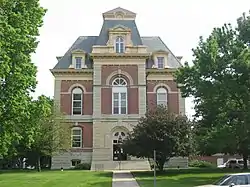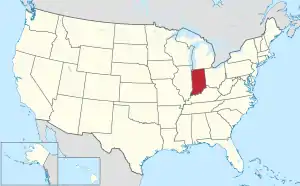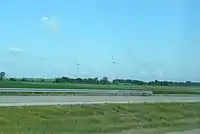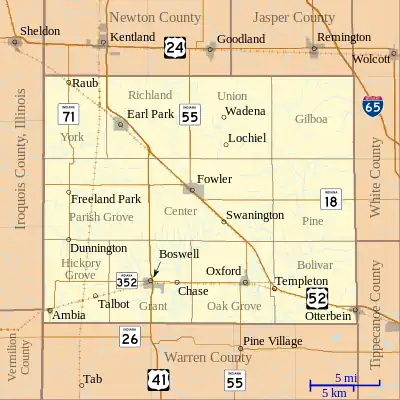Benton County, Indiana
Benton County is located in the northwest part of the U.S. state of Indiana, along the border with Illinois. As of 2020, the county's population was 8,719.[1] It contains six incorporated towns as well as several small unincorporated settlements; it is divided into 11 townships which provide local services.[2][3] The county seat is Fowler.[4]
Benton County | |
|---|---|
 Benton County Courthouse in Fowler, Indiana. | |
 Flag | |
 Location within the U.S. state of Indiana | |
 Indiana's location within the U.S. | |
| Coordinates: 40°37′N 87°19′W | |
| Country | |
| State | |
| Founded | 18 February 1840 |
| Named for | Senator Thomas H. Benton |
| Seat | Fowler |
| Largest city | Fowler |
| Area | |
| • Total | 406.51 sq mi (1,052.9 km2) |
| • Land | 406.42 sq mi (1,052.6 km2) |
| • Water | 0.09 sq mi (0.2 km2) 0.02% |
| Population (2020) | |
| • Total | 8,719 |
| • Density | 21/sq mi (8.3/km2) |
| Time zone | UTC−5 (Eastern) |
| • Summer (DST) | UTC−4 (EDT) |
| Congressional district | 4th |
| Website | www |
| |
Benton County is part of the Lafayette, Indiana, Metropolitan Statistical Area.

History
The lands of present NW Indiana were explored by French explorer Robert de LaSalle. At that time the area was inhabited by the Miami Confederation of Indians. Through White settlement, encroachment, and confrontation, the various indigenous groups were forced to cede their claim to the area. In October 1818, the Pottawattamies, Weas, and Delawares ceded their lands west of the Tippecanoe River to the government. In a treaty dated 23 October 1826, the Pottawattamie and Miamis ceded all their lands east of the Tippecanoe. A treaty dated 26 October 1832 with the Pottawattamie ceded control of the northwestern part of Indiana; on 27 October the Pottawattamie of Indiana and Michigan also relinquished all claim to any remaining land in those states.
Before 1832, this area was not open to settlement; previous settlers had taken the southern parts of Ohio, Indiana and Illinois. Northwestern Indiana was also less desirable for farming, being described as alternate swamps, sterile sand ridges and flat, wet prairies, although it did proliferate in game.
A state legislative act dated 7 February 1835 created two counties in this area, Newton and Jasper. The county governments were not created at that time and the counties were attached to White County for administrative purposes. The Jasper County organization was effected beginning 15 March 1838. On 18 February 1840, the county of Benton was formed from Jasper's area. It was named for Thomas H. Benton (D), U.S. Senator from Missouri.[5] The original county seat selected in 1843 was Oxford, but after a long struggle between contending factions it was moved to Fowler in 1874.[6]
Courthouse
The current Benton County courthouse, located in Fowler, was designed by Gurdon P. Randall of Chicago and built in 1874 by Levi L. Leach at a cost of $62,257.[n 1] The new courthouse was an impressive building from an architectural standpoint, but also provided much-needed improvements in security, including large fire-proof vaults. Randall had designed the Marshall County courthouse a few years earlier.[8]
Economy
In 2008 the Benton County Wind Farm began operating with 87 1.5 MW wind turbines.[9] Duke Energy purchases electricity from the wind farm and sells it to customers through its GoGreen program.[10]
In 2009 the Fowler Ridge Wind Farm opened nearby,[11] giving Benton County one of the largest concentrations of wind turbines in the United States east of the Mississippi River.[12]
Geography

Benton County lies along the state's western border with Illinois. It consists of low rolling hills, with all available terrain devoted to agriculture or development. Data gathered from space shuttle measurements list the county's lowest elevation as 138 meters (453 feet) and its highest elevation as 240 meters (790 feet).[13] However, a knoll 4 miles (6.4 km) NNW of Boswell is shown on official topographic maps as 915 feet (279 meters) ASL.[14]
According to the 2010 census, the county has a total area of 406.51 square miles (1,052.9 km2), of which 406.42 square miles (1,052.6 km2) (or 99.98%) is land and 0.09 square miles (0.23 km2) (or 0.02%) is water.
Adjacent counties
- Newton County - northwest
- Jasper County - northeast
- White County - east
- Tippecanoe County - southeast
- Warren County - south
- Vermilion County, Illinois - southwest
- Iroquois County, Illinois - west
Unincorporated towns
- Atkinson
- Barce
- Chase
- Dunnington
- Fargo
- Foresman
- Free
- Freeland Park
- Gravel Hill
- Handy
- Lochiel
- Powley Corners (partial)
- Raub
- Swanington
- Talbot
- Templeton
- Wadena
Major highways
Education
The county's four public schools are administered by the Benton Community School Corporation.
- Benton Central Junior-Senior High School
- Boswell Elementary School (closed at end of May 2021) [15][16]
- Otterbein Elementary School
- Prairie Crossing Elementary School[17]
- Sacred Heart Elementary, the county's only parochial school[18]
Climate and weather
| Fowler, Indiana | ||||||||||||||||||||||||||||||||||||||||||||||||||||||||||||
|---|---|---|---|---|---|---|---|---|---|---|---|---|---|---|---|---|---|---|---|---|---|---|---|---|---|---|---|---|---|---|---|---|---|---|---|---|---|---|---|---|---|---|---|---|---|---|---|---|---|---|---|---|---|---|---|---|---|---|---|---|
| Climate chart (explanation) | ||||||||||||||||||||||||||||||||||||||||||||||||||||||||||||
| ||||||||||||||||||||||||||||||||||||||||||||||||||||||||||||
| ||||||||||||||||||||||||||||||||||||||||||||||||||||||||||||
In recent years, average temperatures in Fowler have ranged from a low of 13 °F (−11 °C) in January to a high of 84 °F (29 °C) in July, although a record low of −24 °F (−31 °C) was recorded in January 1999 and a record high of 99 °F (37 °C) was recorded in July 1995. Average monthly precipitation ranged from 1.59 inches (40 mm) in February to 4.50 inches (114 mm) in June.[19]
Government
The county government is a constitutional body granted specific powers by the Constitution of Indiana and the Indiana Code. The county council is the legislative branch of the county government, controlling spending and revenue collection. Representatives, elected to staggered four-year terms from county districts, determine salaries, the annual budget and special spending. The council has limited authority to impose local taxes, in the form of an income and property tax that is subject to state level approval, excise taxes and service taxes.[20][21] In 2010, the county budgeted approximately $5 million for the district's schools and $2.8 million for other county operations and services, for a total annual budget of approximately $7.8 million.[22]
The Board of Commissioners is the county's executive body. They are elected countywide, in staggered four-year terms. One commissioner serves as board president. The commissioners execute acts legislated by the council, collecting revenue and managing day-to-day functions of the county government.[20][21]
The county maintains a small claims court that can handle some civil cases. The court judge is elected to a term of four years and must be a member of the Indiana Bar Association. The judge is assisted by a constable who is elected to a four-year term. In some cases, court decisions can be appealed to the state level circuit court.[21]
The county has several other elected offices, including sheriff, coroner, auditor, treasurer, recorder, surveyor and circuit court clerk. They are elected to four-year terms. Members elected to county government positions are required to declare party affiliations and be residents of the county.[21]
Each township has a trustee who administers rural fire protection and ambulance service, provides poor relief and manages cemetery care, among other duties.[3] The trustee is assisted in these duties by a three-member township board. The trustees and board members are elected to four-year terms.[23]
Benton County is in Indiana's 4th Congressional District, represented by Jim Baird in the United States Congress. It is part of Indiana Senate district 6[24] and Indiana House of Representatives district 13.[25] It had previously been part of House District 15.[26]
| Year | Republican | Democratic | Third party | |||
|---|---|---|---|---|---|---|
| No. | % | No. | % | No. | % | |
| 2020 | 3,007 | 73.07% | 1,009 | 24.52% | 99 | 2.41% |
| 2016 | 2,579 | 69.93% | 860 | 23.32% | 249 | 6.75% |
| 2012 | 2,329 | 65.09% | 1,159 | 32.39% | 90 | 2.52% |
| 2008 | 2,183 | 57.19% | 1,563 | 40.95% | 71 | 1.86% |
| 2004 | 2,797 | 70.07% | 1,135 | 28.43% | 60 | 1.50% |
| 2000 | 2,441 | 63.01% | 1,328 | 34.28% | 105 | 2.71% |
| 1996 | 1,947 | 49.92% | 1,311 | 33.62% | 642 | 16.46% |
| 1992 | 2,030 | 46.96% | 1,221 | 28.24% | 1,072 | 24.80% |
| 1988 | 2,698 | 66.31% | 1,349 | 33.15% | 22 | 0.54% |
| 1984 | 3,281 | 70.38% | 1,357 | 29.11% | 24 | 0.51% |
| 1980 | 3,189 | 64.26% | 1,520 | 30.63% | 254 | 5.12% |
| 1976 | 3,093 | 59.09% | 2,071 | 39.57% | 70 | 1.34% |
| 1972 | 3,703 | 70.01% | 1,566 | 29.61% | 20 | 0.38% |
| 1968 | 3,326 | 59.54% | 1,854 | 33.19% | 406 | 7.27% |
| 1964 | 2,886 | 49.49% | 2,940 | 50.42% | 5 | 0.09% |
| 1960 | 3,626 | 60.11% | 2,399 | 39.77% | 7 | 0.12% |
| 1956 | 4,004 | 67.02% | 1,961 | 32.83% | 9 | 0.15% |
| 1952 | 4,125 | 69.25% | 1,815 | 30.47% | 17 | 0.29% |
| 1948 | 3,224 | 57.88% | 2,317 | 41.60% | 29 | 0.52% |
| 1944 | 3,621 | 63.38% | 2,065 | 36.15% | 27 | 0.47% |
| 1940 | 3,675 | 57.57% | 2,689 | 42.12% | 20 | 0.31% |
| 1936 | 2,989 | 47.21% | 3,211 | 50.72% | 131 | 2.07% |
| 1932 | 2,433 | 40.67% | 3,496 | 58.43% | 54 | 0.90% |
| 1928 | 3,360 | 58.37% | 2,368 | 41.14% | 28 | 0.49% |
| 1924 | 3,250 | 58.14% | 2,104 | 37.64% | 236 | 4.22% |
| 1920 | 3,900 | 64.13% | 2,098 | 34.50% | 83 | 1.36% |
| 1916 | 1,872 | 54.17% | 1,502 | 43.46% | 82 | 2.37% |
| 1912 | 1,030 | 30.42% | 1,425 | 42.09% | 931 | 27.50% |
| 1908 | 1,936 | 53.48% | 1,566 | 43.26% | 118 | 3.26% |
| 1904 | 2,098 | 56.60% | 1,470 | 39.65% | 139 | 3.75% |
| 1900 | 2,032 | 54.98% | 1,563 | 42.29% | 101 | 2.73% |
| 1896 | 1,998 | 55.13% | 1,582 | 43.65% | 44 | 1.21% |
| 1892 | 1,617 | 50.82% | 1,391 | 43.71% | 174 | 5.47% |
| 1888 | 1,626 | 52.18% | 1,425 | 45.73% | 65 | 2.09% |
Demographics
| Census | Pop. | Note | %± |
|---|---|---|---|
| 1850 | 1,144 | — | |
| 1860 | 2,809 | 145.5% | |
| 1870 | 5,615 | 99.9% | |
| 1880 | 11,108 | 97.8% | |
| 1890 | 11,903 | 7.2% | |
| 1900 | 13,123 | 10.2% | |
| 1910 | 12,688 | −3.3% | |
| 1920 | 12,206 | −3.8% | |
| 1930 | 11,886 | −2.6% | |
| 1940 | 11,117 | −6.5% | |
| 1950 | 11,462 | 3.1% | |
| 1960 | 11,912 | 3.9% | |
| 1970 | 11,262 | −5.5% | |
| 1980 | 10,218 | −9.3% | |
| 1990 | 9,441 | −7.6% | |
| 2000 | 9,421 | −0.2% | |
| 2010 | 8,854 | −6.0% | |
| 2020 | 8,719 | −1.5% | |
| US Decennial Census[28] 1790-1960[29] 1900-1990[30] 1990-2000[31] 2010[32] | |||
As of the 2020 United States Census, there were 8,719 people and 3,432 households in the county. The population density was 21.8 inhabitants per square mile (8.4/km2). There were 3,939 housing units. The racial makeup of the county was 92.1% White, 1.1% Black or African American, 0.2% Asian, 0.3% American Indian or Native Alaskan, 0.1% Native Hawaiian or other Pacific Islander, and 1.3% from two or more races. Those of Hispanic or Latino origin made up 5.4% of the population.[33] In terms of ancestry, 25.6% were German, 12.9% were Irish, 5.4% were English, and 5.2% were French (not Basque).[34]
Of the 3,432 households, 31.2% had children under the age of 18 living with them. The average household size was 2.49.[33] The median age was 40.5 years old.[34] Of the total population, 18.5% have a visual or non-visual disability.[34]
The median income for a household in the county was $49,488 and the median income for a family was $57,131 and $32,055 for nonfamily households.[34] The per capita income for the county was $25,187.[33] Additionally, 13.5% of the population were below the poverty line, including 19.4% of those under age 18 and 5.8% of those age 65 or over.[34]
Of the total 2020 population, 6.5% of were veterans. Regarding educational attainment, 42.8% earned a high school diploma or equivalent and 16.1% a bachelor's degree or higher. Of those employed, 20.4% work in education, health care and social services; 19.9% work in manufacturing, 10.1% work in retail, and 8.6% work in agriculture, forestry, fishing, hunting or mining. Finally, 35.4% of science, technology, engineering and math jobs are held by females.[34]
In Benton County, there were 3,783 housing units and 74% of the population owned homes in 2020 with 23.1% of the housing stock occupied by renters.[34]
Notes
- A $62,257 capital expense in 1874 would be roughly equivalent to $15,000,000 in 2009.[7]
References
- "Benton County, Indiana". United States Census Bureau. Retrieved May 29, 2023.
- "Benton". Indiana Township Association. Archived from the original on September 21, 2010. Retrieved September 12, 2010.
- "Duties". United Township Association of Indiana. Retrieved January 6, 2011.
- "Find a County – Benton County IN". National Association of Counties. Archived from the original on July 19, 2011. Retrieved January 6, 2011.
- Baker, Ronald L.; Carmony, Marvin (1975). Indiana Place Names. Bloomington IN: Indiana University Press. p. 12.
- De Witt Clinton Goodrich & Charles Richard Tuttle (1875). An Illustrated History of the State of Indiana. Indiana: R. S. Peale & co. pp. 551–552.
- Williamson, Samuel H. (April 2010). Seven Ways to Compute the Relative Value of a U.S. Dollar Amount, 1774 to present. MeasuringWorth. Calculations made using Nominal GDP Per Capita, a measure of capital intensivity, using "the 'average' per-person output of the economy in the prices of the current year." This is a measure of the amount of capital and volume of labor required to reproduce the work over varying production methods, but assuming that money represents a proportion of the economy.
- Counts, Will; Jon Dilts (1991). The 92 Magnificent Indiana Courthouses. Bloomington IN: Indiana University Press. pp. 14–15. ISBN 978-0-253-33638-5.
- "Benton County Wind Farms". Archived from the original on June 5, 2009. Retrieved June 21, 2009.
- "Duke Energy's GoGreen Power". Duke Energy. Retrieved June 21, 2009.
- "US Wind Energy Projects - Indiana". American Wind Energy Association. March 31, 2009. Archived from the original on September 18, 2010. Retrieved June 20, 2009.
- "Top Plants: Fowler Ridge Wind Farm, Benton County, Indiana". POWER Magazine. December 1, 2009. Retrieved December 23, 2022.
- "Free Benton County, Indiana Topo Maps & Elevations". www.anyplaceamerica.com.
- "Peakbagger.com Large Map Page". www.peakbagger.com.
- Dept. of Education, Indiana (2020–2021). "Boswell student demographics|". Archived from the original on August 8, 2022. Retrieved August 8, 2022.
- Doty, Clayton (April 7, 2021). "Last day at Boswell Elementary". The Benton Review. Retrieved March 21, 2022.
- "Prairie Crossing Elementary". Prairie Crossing Elementary. May 5, 2009. Archived from the original on May 5, 2009. Retrieved February 18, 2022.
- "Sacred Heart, Fowler". Sacred Heart, Fowler. January 21, 2016. Archived from the original on January 21, 2016. Retrieved February 18, 2022.
- "Monthly Averages for Fowler IN". The Weather Channel. Retrieved January 27, 2011.
- Indiana Code. "Title 36, Article 2, Section 3". Government of Indiana. Archived from the original on October 5, 2008. Retrieved September 16, 2008.
- Indiana Code. "Title 2, Article 10, Section 2" (PDF). Government of Indiana. Archived from the original (PDF) on October 29, 2008. Retrieved September 16, 2008.
- State of Indiana Department of Local Government Finance. "2010 Budget Order (Benton County)" (PDF). Archived from the original (PDF) on July 21, 2011. Retrieved February 19, 2011.
- "Government". United Township Association of Indiana. Retrieved January 6, 2011.
- "Indiana Senate Districts". State of Indiana. Retrieved January 23, 2011.
- "House District Map 2020 (accessed 4 July 2020)".
- "Indiana House Districts". State of Indiana. Retrieved January 23, 2011.
- Leip, David. "Atlas of US Presidential Elections". uselectionatlas.org. Retrieved April 11, 2018.
- "US Decennial Census". US Census Bureau. Retrieved February 17, 2021.
- "Historical Census Browser". University of Virginia Library. Retrieved July 10, 2014.
- "Population of Counties by Decennial Census: 1900 to 1990". US Census Bureau. Retrieved July 10, 2014.
- "Census 2000 PHC-T-4. Ranking Tables for Counties: 1990 and 2000" (PDF). US Census Bureau. Retrieved July 10, 2014.
- "Benton County QuickFacts". US Census Bureau. Archived from the original on August 6, 2011. Retrieved September 17, 2011.
- "U.S. Census Bureau QuickFacts: Benton County, Indiana; California". U.S. Census Bureau. Retrieved February 18, 2022.
- "Benton County, Indiana". U.S. Census Bureau. Retrieved February 18, 2022.
Bibliography
- Goodspeed, Weston A. (1883). "Part III. History of Benton County". Counties of Warren, Benton, Jasper and Newton, Indiana. Chicago: F. A. Battey and Company. pp. 213–407. Retrieved September 19, 2010.